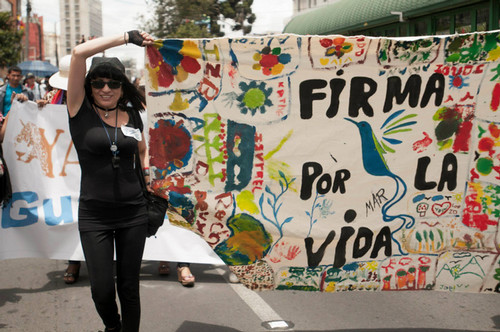Climate Justice in Latin America Fall Guest Lecture Series
 Series hosted by Professor Claudia Horn Madeleine Haas Russell Postdoctoral Fellow in Climate Crisis, Risks, and Responses
Series hosted by Professor Claudia Horn Madeleine Haas Russell Postdoctoral Fellow in Climate Crisis, Risks, and Responses
Indigenous Visions for Climate Justice
Wednesday, September 27, 2:30 pm
Join the Event on Zoom, RSVP here
Terms like ‘climate justice’ or ‘just transition’ have become mainstream. Still, many use them without concrete meaning and a clear objective of operationalizing climate justice in policy and practice. Recognizing the diversity of understandings and demands around the term climate justice within Indigenous Peoples and institutions is a first step for engaging in constructive conversations to include Indigenous perspectives in official adaptation narratives. In this online lecture, we will learn about the research project “Indigenous Visions for Climate Justice,” which looks at ongoing adaptation processes, such as National Adaptation Plans and Nationally Determined Contributions (NDC) implementation, in Chile and Peru and their inclusion of Indigenous perspectives in policy development and implementation. We will also learn about the methodology of “action research” in this context.
About the Guest Speaker
Maritza Paredes is a Senior Lecturer at the Pontifical Catholic University of Peru. Her research focuses on environmental and subnational conflicts and mobilizations concerning the governance of extractive industries, climate change, commodities, and indigenous peoples. She holds a Ph.D. from Oxford University and an MA from Columbia University.
Yes to Yasuní. Ecuadorian Activists Discuss the Referendum Against Oil
Monday, October 2, 2:30 pm, RSVP here
Join the Event In Person or on Zoom
Room: Mandel 303 Reading Room
On August 20, Ecuadorians voted in a historic referendum to halt all future oil drilling in the sensitive protected area Yasuní in the Amazon rainforest, known for its fragile ecosystem and isolated Indigenous communities. The Yasuní National Park has been at the center of legal, environmental, and human rights debates for decades, and the overwhelming mobilization to “keep the oil in the ground” against extractivist interests is mainly due to the Yasunídos movement of indigenous and environmental activists and organizations. In this hybrid event, we will debate with two activists from the campaign–one visiting Brandeis University and one in Ecuador via Zoom–who will discuss the history of the fight against oil in Ecuador, indigenous people’s rights, the context of the referendum, and the strategic implications in Ecuador, the Amazon region, Latin America, and beyond. This event will be interpreted (ENG-ESP).
About the Guest Speakers
Antonella Calle Avilés has been a socio environmental rights defender for over 12 years. She is a founding member and communications coordinator of the Yasunidos collective for the national campaign for the consultation of the Yasuní. Avilés has participated in various initiatives and campaigns to defend nature's and people's rights against mining and oil extractivism in the Ecuadorian Amazon. She has a degree in social communication and a master's in communication.
Eduardo Pichilingue Ramos is an Ecologist at Quito University. He has worked for more than 20 years in Yasuni and the protection of indigenous peoples in isolation there. Between 2004 and 2007, he was the spokesperson for the citizen oversight group for the Protection of Isolated Indigenous Peoples. In 2008, he became the first Coordinator of the Office for the Protection of Isolated Indigenous Peoples at the Ministry of Environment of Ecuador for two years. Ramos was the National Director of the Yasuní Program, executed by the United Nations, and the spokesperson for the Yasuní-ITT Initiative. He has been a member of the International Advisory Committee for the Protection of Indigenous Peoples.
Decolonizing Environmental Governance
Wednesday October 25, 2:30 pm
Join the Event on Zoom, RSVP here
Scholars are beginning to demonstrate how colonial legacies interact with market-based conservation policies in ways that increase their risk of failure, deepen on-the-ground inequalities, and cement global injustices. This session engages with growing demands to decolonize conservation and the knowledge systems that support it. In this online lecture, we will explore how temporalities and geographies of colonialism undergird long-standing hegemonies and perpetuate exploitative power relations in the governing of nature-society relations, particularly in the Global South. We will also chart paths for imagining how these relations can be decolonized, using the case of forests in Guyana and Suriname.
About the Guest Speaker
Ariadne Collins is a Lecturer in the School of International Relations. Her work lies at the intersection of climate change governance, environmental policy, and international development. More specifically, she analyses the interplay between market-based conservation and post-colonial development. Her work emphasizes racialization processes and colonialism histories and their challenge to the successful enactment of forest governance policies in the Global South